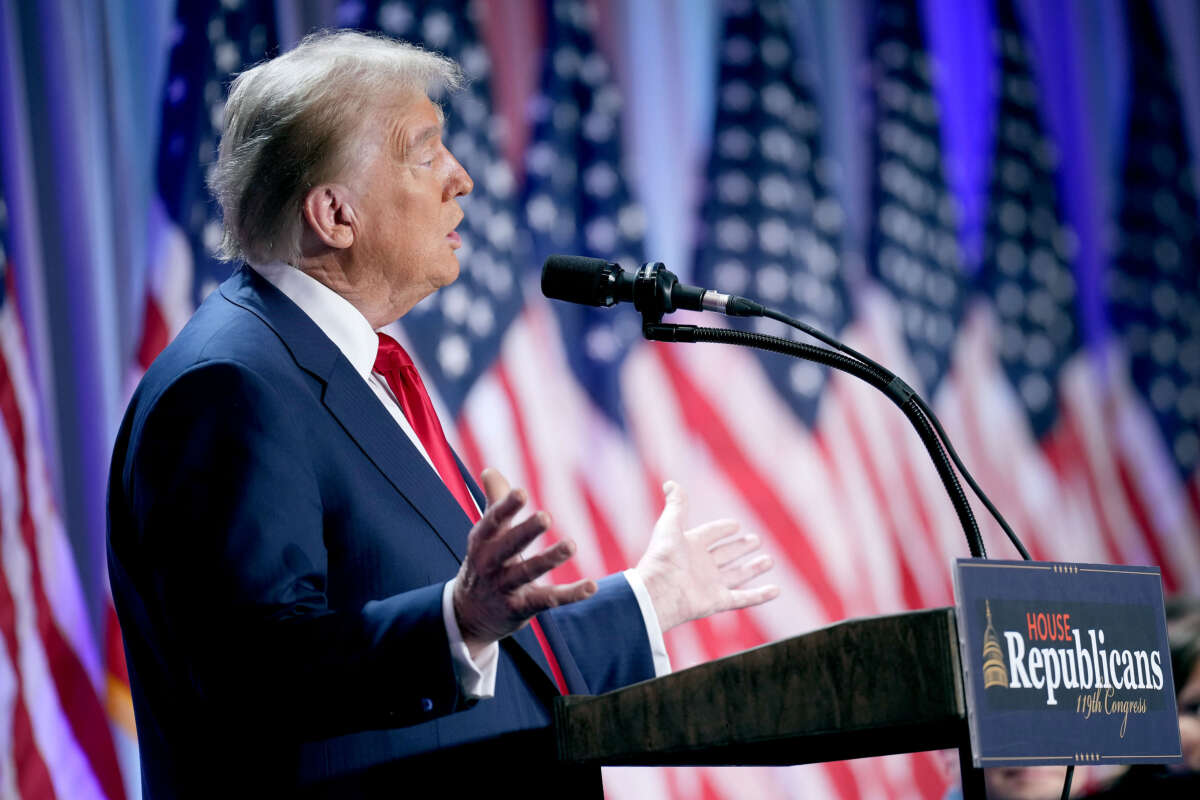After spending the bulk of the presidential campaign trying to distance himself from the far right policy proposals outlined in Project 2025, president-elect Donald Trump stated in a recent interview that he does, in fact, like many of the proposals included in the document.
Over the past year, Trump pushed back against assertions that he was associated with or supported any part of Project 2025, a Heritage Foundation-sponsored roadmap of far right proposals for the next Republican president that was viewed negatively by many voters.
“I have nothing to do with Project 2025,” Trump claimed during the presidential debate with his Democratic opponent for president Kamala Harris.
Despite these claims, there were clear indicators that Trump was actually supportive of Project 2025, including early on in its development. In 2022, for instance, Trump spoke at a Heritage event where he lauded the organization’s effort to formulate the document, stating that they were “lay[ing] the groundwork” for the future of conservatism and for his possible return to the White House.
Now, more than one month out from winning the 2024 presidential race, Trump is saying that he’s not entirely opposed to Project 2025 after all.
In his Time magazine interview after being named “Person of the Year,” Trump said there are still “some things” he disagrees with when it comes to Project 2025, though he didn’t elaborate on what those things were. He added, however, that he doesn’t “disagree with everything” in the right-wing manifesto, adding, “they have some things that are very conservative and very good,” in his opinion.
Trump also acknowledged that, despite his supposed antipathy toward the document just a few weeks ago, he has been nominating people who contributed to the creation of Project 2025 to positions of power in his incoming White House administration.
Trump has nominated Russ Vought, for example, a former member of his administration in his first term, to become the head of Office of Management and Budget. Vought, a Christian nationalist and deep devotee to Trump, was a key promoter and contributor to Project 2025, and in hidden camera discussions after Trump disavowed the document, said that he believed the Republican candidate was only distancing himself from the plan in order to win the race, and that it didn’t bother him.
Trump is “very supportive of what we do,” Vought said in those discussions, adding that Trump had “blessed” his organization’s work to quietly continue Project 2025-related projects during the campaign.
Trump has nominated numerous others who were involved in Project 2025, including Brendan Carr to head the Federal Communications Commission (FCC). Carr wrote the section of Project 2025 calling for dismantling regulations the agency currently enforces. Trump has also named Tom Homan, his former head of Immigration and Customs Enforcement (ICE) and another contributor to Project 2025, to be his “border czar.”
Several elements of Project 2025 are anti-democratic and dangerous. The document includes plans to crack down on whistleblowers and journalists, for example, and calls for rolling back protections against government spying on members of the media. It also calls for outlawing what it describes as “transgender ideology” — policies that acknowledge, respect and protect transgender people — and demands government-enforced discrimination based on a “binary meaning of sex.”
Project 2025 additionally seeks to further erode reproductive rights across the country, including by banning the transportation of abortion medication through the mail. The document also targets immigrants and their families living in the U.S., advocating for mass deportations, raids, and an end to the constitutional right of birthright citizenship.
Angry, shocked, overwhelmed? Take action: Support independent media.
We’ve borne witness to a chaotic first few months in Trump’s presidency.
Over the last months, each executive order has delivered shock and bewilderment — a core part of a strategy to make the right-wing turn feel inevitable and overwhelming. But, as organizer Sandra Avalos implored us to remember in Truthout last November, “Together, we are more powerful than Trump.”
Indeed, the Trump administration is pushing through executive orders, but — as we’ve reported at Truthout — many are in legal limbo and face court challenges from unions and civil rights groups. Efforts to quash anti-racist teaching and DEI programs are stalled by education faculty, staff, and students refusing to comply. And communities across the country are coming together to raise the alarm on ICE raids, inform neighbors of their civil rights, and protect each other in moving shows of solidarity.
It will be a long fight ahead. And as nonprofit movement media, Truthout plans to be there documenting and uplifting resistance.
As we undertake this life-sustaining work, we appeal for your support. Please, if you find value in what we do, join our community of sustainers by making a monthly or one-time gift.
